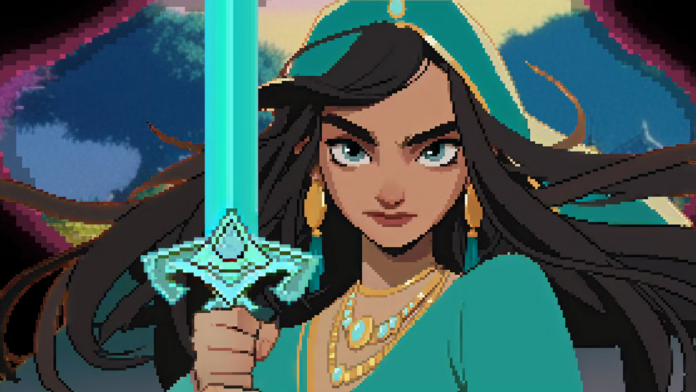In the indie game dev scene, the use of AI is often met with suspicion and disdain. Many see AI as an evil tool that scours the internet, grabs bits and pieces of other people’s work, and spits out bizarre creations with seven fingers. But AI comes in many forms, and some developers see it as a tool to enhance storytelling and create unique, immersive experiences, all while keeping a close eye on the ethical concerns surrounding its use.
Meet Ada Eden, the development team of 1001 Nights. In their game, AI isn’t just a feature, it’s part of the narrative. Players become Shahrazad, a storyteller facing execution who must engage the King with tales. Using her power to turn language into reality, players need to guide the King to mention words like ‘sword’ or ‘shield’, which materialize as weapons she’ll later use against him. “What always resonates with people is the core story about human emotions and conflicts.”
The love for storytelling has been a driving force behind this project for Ada Eden’s founder Yuqian Sun, and she combines it with her passion for conversational AI, which she’s been exploring since 2018. “Even though most people believe that AI -like Siri- will always be ‘stupid,’ I felt that conversational AI could potentially tell the fun, story-driven experiences I enjoy,” she explains.
Grandmother of ChatGPT
Her vision for 1001 Nights started during a game design course in 2020 at Goldsmiths, where she thought about making something based on natural language interactions, using a story everyone knows. “I wanted to use a story that everyone is familiar with so I could design something new,” she says. That familiar story became the famed One Thousand and One Nights, a tale that involves layers of storytelling and clever manipulation of narrative. In short, perfectly suited for the experimental framework she had in mind.
In 2020, Sun began working with GPT-2, the grandmother of ChatGPT. She used Gutenberg’s collection of short stories to train the old model, and it worked. Despite the AI’s limited capabilities at the time, Sun managed to cleverly guide it into producing specific responses. The game was exhibited in art galleries across China and the US, as well as at academic conferences. With the release of ChatGPT in late 2022, the game became more sophisticated, incorporating new features and content.
Turn story into weapons
The gameplay of 1001 Nights is structured around the idea of Shahrazad, the protagonist, turning stories into weapons. But the real twist is the way players interact with the King, her adversary. You must weave stories that align with his worldview, using words not just to tell tales but to change reality. “You need to trick the King, the enemy, to follow your narrative, which will finally punish him,” Sun says.
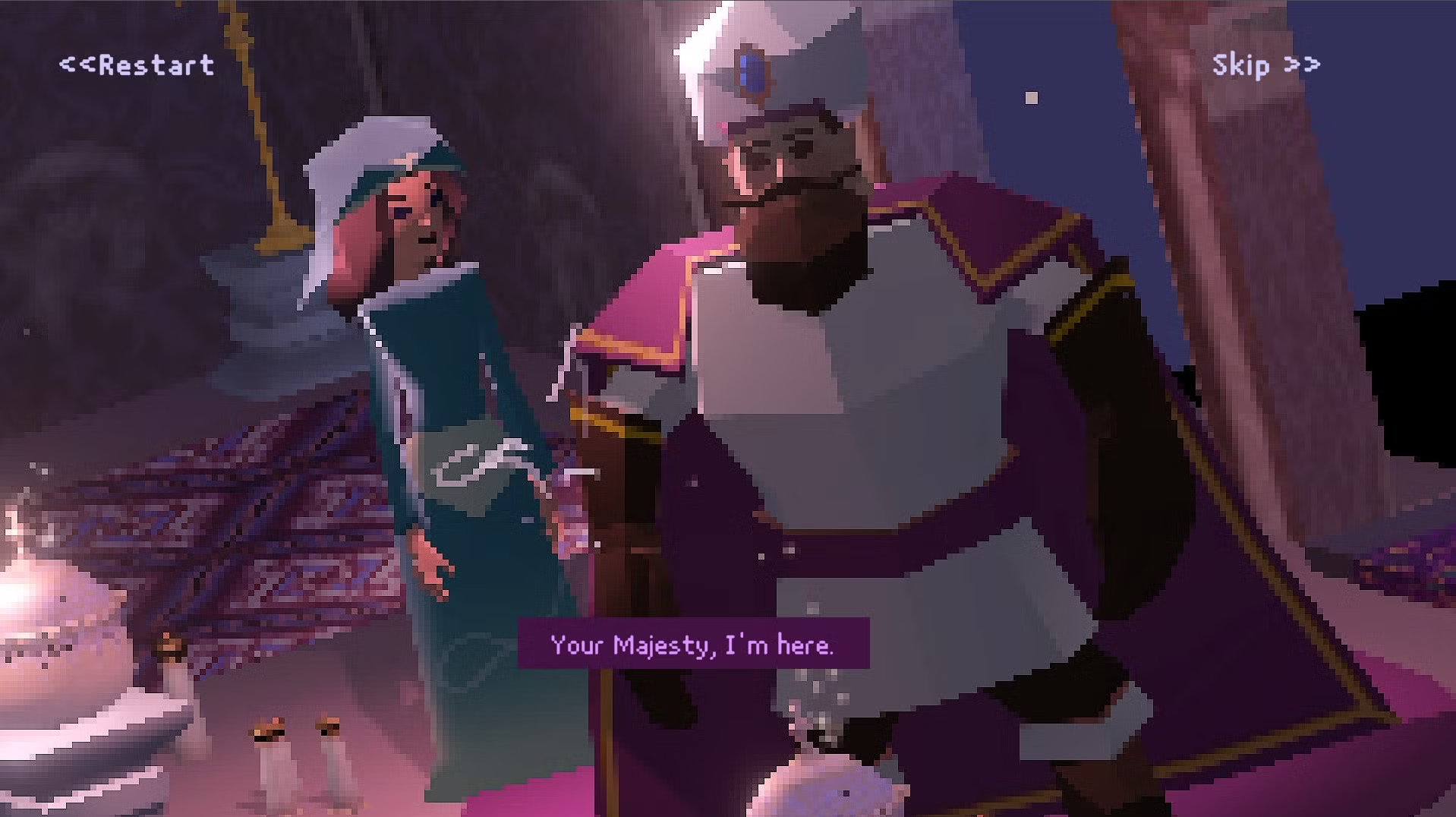
Although the game leverages AI heavily, its core story is rooted in ancient Persia, not in a futuristic or cyberpunk world. “I’m very proud of how we present the underlying retro and mysterious theme from folklore,” she notes. By avoiding the all-too-common route of setting AI-based games in dystopian futures, Sun’s team draws inspiration from classical literature, making the game timeless while keeping the focus on human emotions and conflicts. “Works we considered sci-fi before -like the movie Her- may soon become less impressive as technology advances,” she points out, but “what always resonates with people is the core story about human emotions and conflicts.”
Pixel Art’s great aesthetics
Visually, 1001 Nights is as compelling as its narrative. The game’s pixel art style is a deliberate choice, inspired by Sun’s love of retro games and her childhood spent playing Game Boy and PlayStation Portable. “I especially took reference from A Short Hike, which uses 3D to 2D,” she says. The style isn’t just an aesthetic preference, though, it also serves a functional purpose. Pixel art allows for a wider range of generative content, giving the team the flexibility to integrate various assets seamlessly. As Sun explains, “Pixel art has more tolerance towards different kinds of content and assets, and it shows great aesthetics that realism games cannot.”
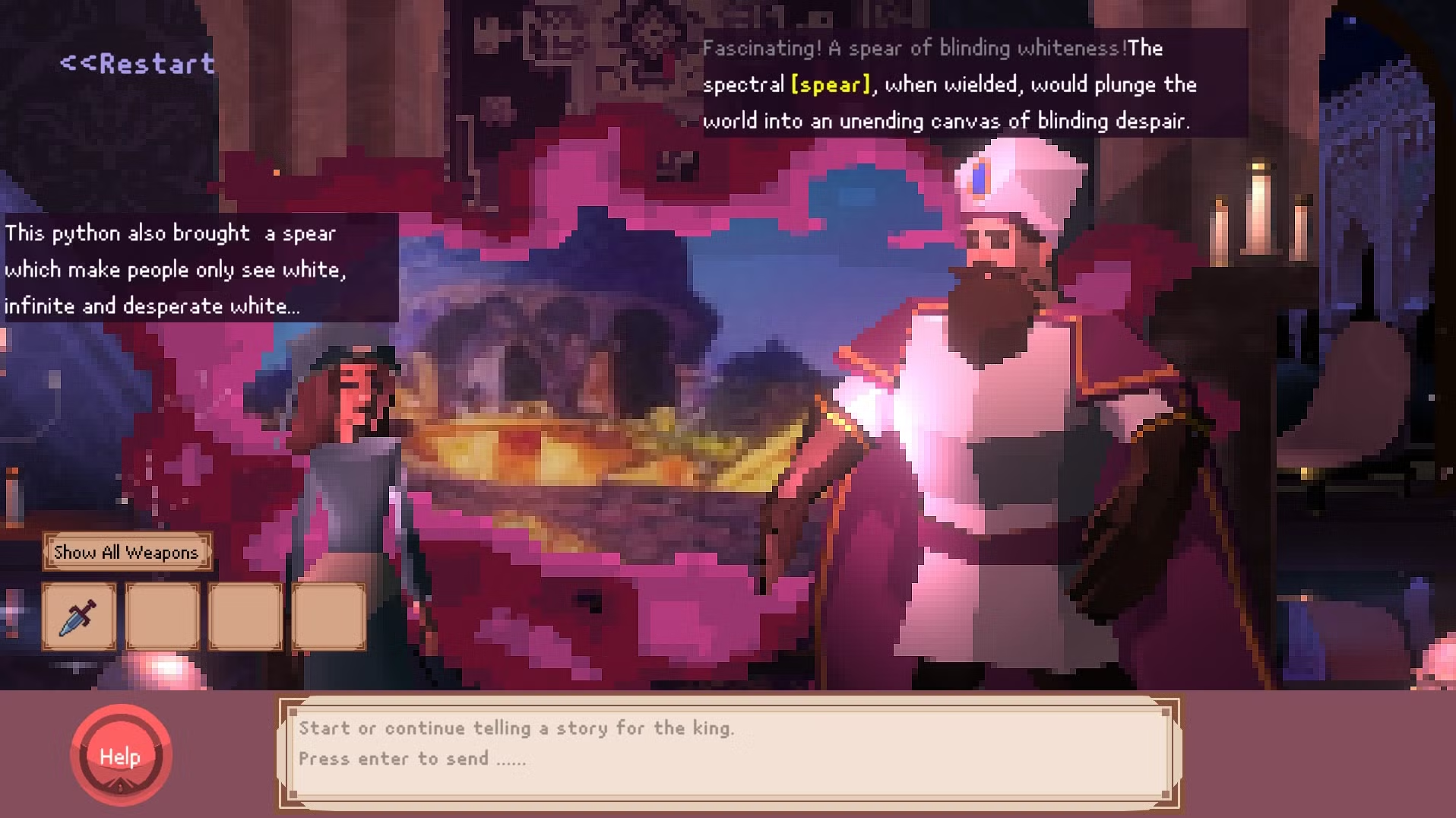
As for the future of 1001 Nights, Sun emphasizes that the game is still evolving. While the current demo on itch.io offers a glimpse of its potential, the team plans to release a much more content-rich demo on Steam this October. “We plan to make multiple chapters with more complicated and fun gameplay, with a higher-level story about how exactly Shahrazad goes through the 1001 nights,” she explains. The game will eventually feature generative NPCs, characters within the player’s stories who step out into the palace, interacting with Shahrazad and the King. However, this is still in the experimental phase, and the team, limited by time and resources, is working hard to bring it to life.
Something novel
Game development is no easy feat, especially for a self-funded indie project like this. Sun admits that managing time and energy is one of the hardest parts of the process. “I’m based in London, and our 8 to 9 core members are spread across China, UK, and North America. Each month we need to decide, ‘okay, this is the part we’re able to do, and this is the part we’re not able to.’ All choices are hard,” she says.
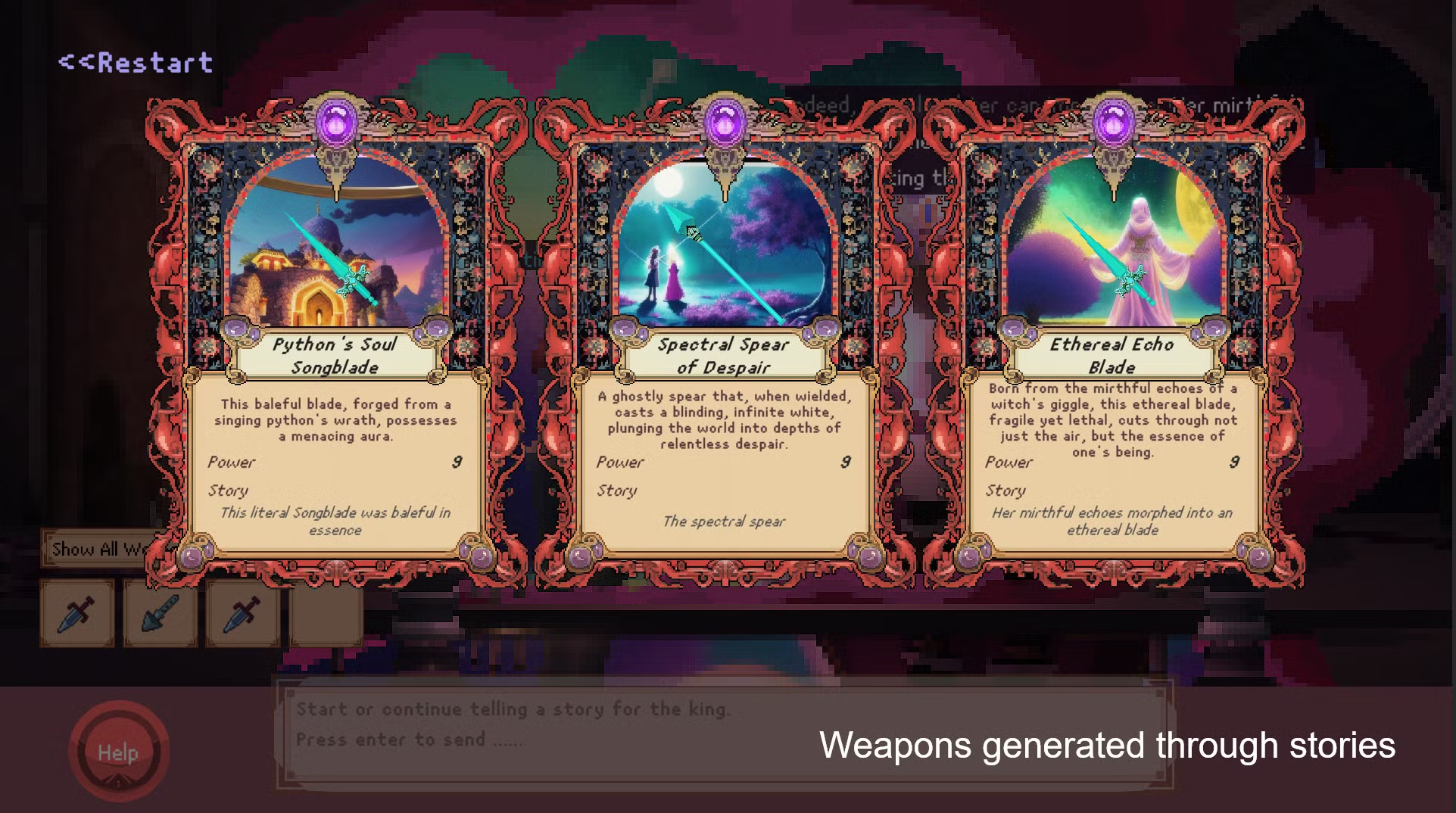
The team often has more ideas than they can deliver, and unexpected problems -like having their OpenAI key stolen during a major submission- make the process even more challenging. Despite these hurdles, the team remains motivated by their shared goal. “We still enjoy it because we believe we’re presenting something novel to the world. To get through, we have a very united, collaborative team who trust each other,” Sun says.
Ethics of AI
Looking ahead, Sun is excited about what AI could mean for indie developers. Games like the pioneering Façade and newer projects like Suck Up! and Yandere AI Girlfriend have shown that AI can create novel gameplay experiences that feel fresh and unexpected. “I believe the opportunity brought by AI technology for indie developers is to find something new, to create experiences which were impossible before,” she says.
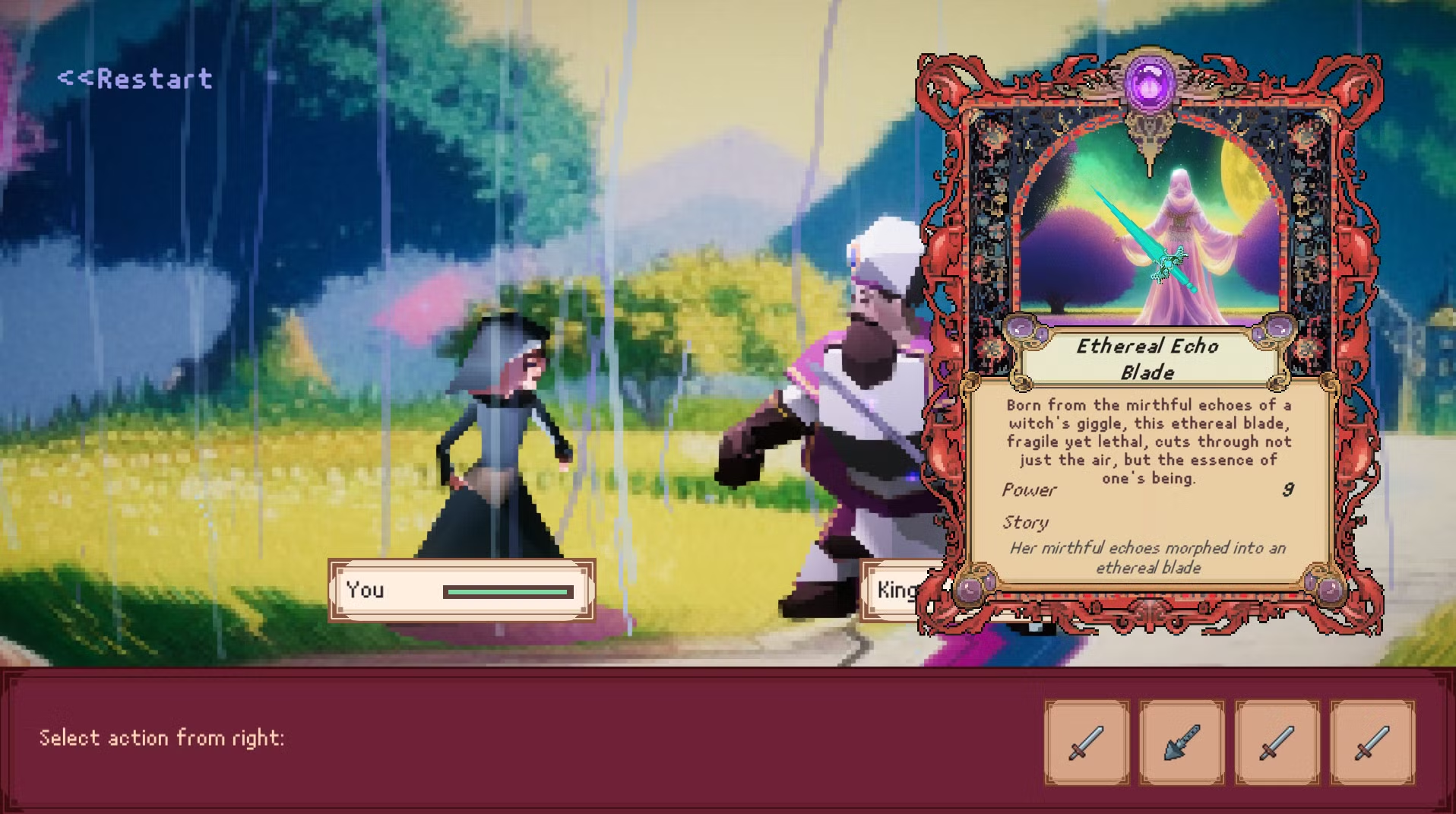
However, Sun’s not without her reservations. Concerns about the ethics of AI and regulatory issues loom large in her mind. Still, as a researcher and indie developer, her focus is on transparency. “I publish all the workflow in papers, so anyone who reads them can understand what happens in the system,” she explains. “I put an AI content disclosure on the game page. Although everyone is still exploring the concerns and practices of AI implementation in games, this is one of the few things I can do to contribute to the conversation.” For her, it’s about using AI as a tool to create unique storytelling, rather than letting the technology overshadow the story itself.
Power of Narrative
Ultimately, 1001 Nights is a game that uses cutting-edge technology to tell a timeless story. It’s a game about AI, but really it’s not about AI. It’s about Shahrazad, the power of narrative, and how storytelling shapes the world around us. The team at Ada Eden have taken a classic story and used AI to breathe new life into it, allowing players to interact with and reshape the narrative in ways that feel fresh and innovative. As Sun puts it, “I hope to see more games that make fun from the technology, not just games made by the technology itself. I want our stories, told by indie developers, to transcend the technology and reflect our voices.”
Play the 1001 Nights demo on Itch.io or wait for a more advanced demo on Steam. Interested in reading Sun’s papers? Check out her V1 Paper here and V2 Paper here.

